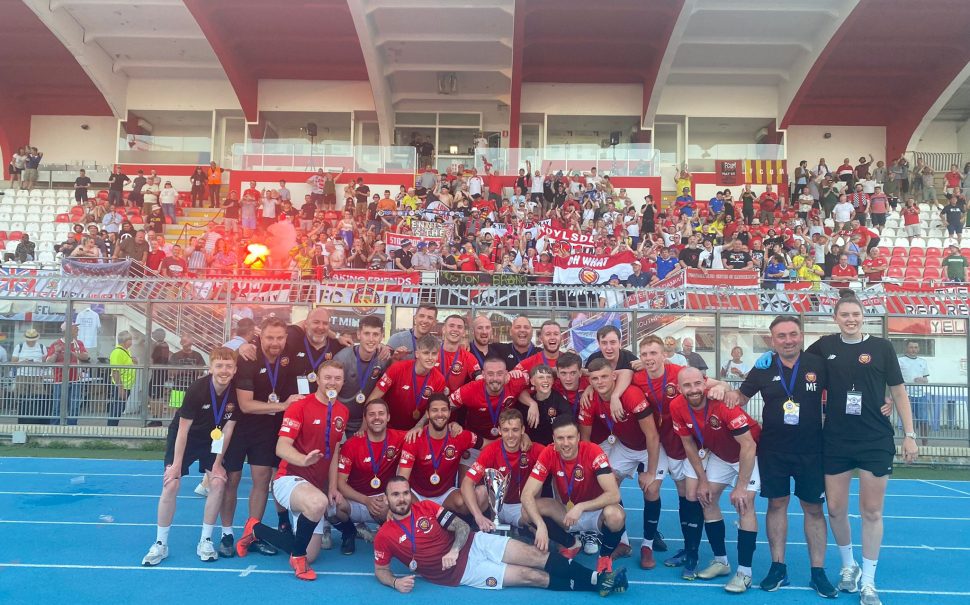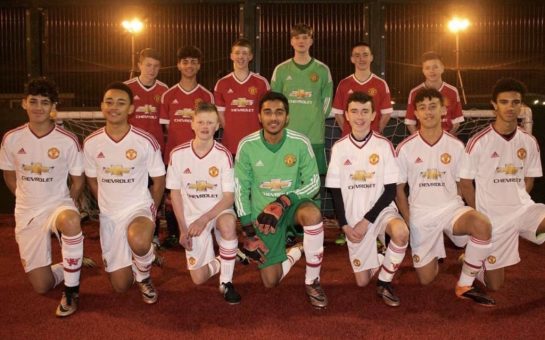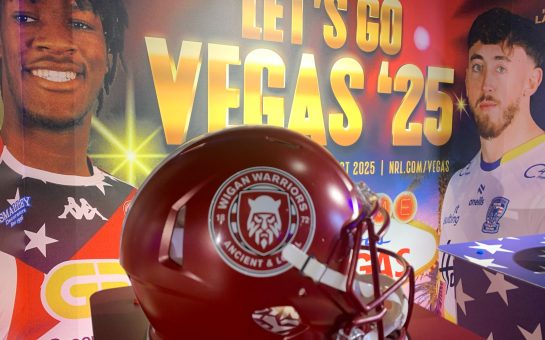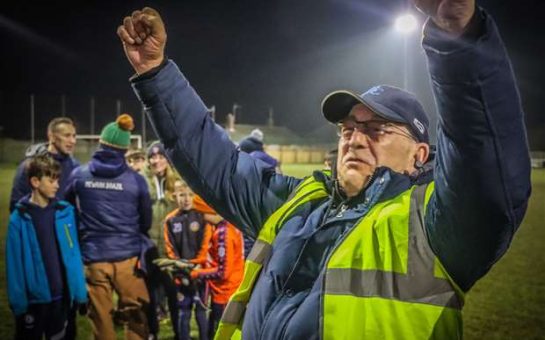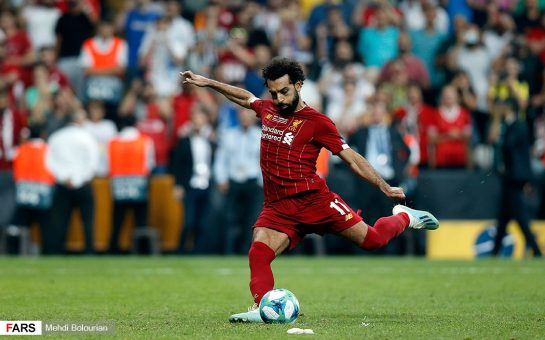Fan-owned football club FC United of Manchester was born out of protests over the Glazer family’s takeover of Manchester United in 2005.
Now, with the Old Trafford outfit up for sale after a 17-year reign marred by controversy, non-league FC are kings of Europe.
Well, sort of.
Their triumph back in June came in the inaugural Fenix Trophy – a competition for semi-professional and amateur sides – and means they are currently the only English side to hold a European title.
The final took place in the Italian city of Rimini with 900-strong support travelling across the continent – and the club are looking to continue their success this season by retaining the trophy and achieving promotion domestically.
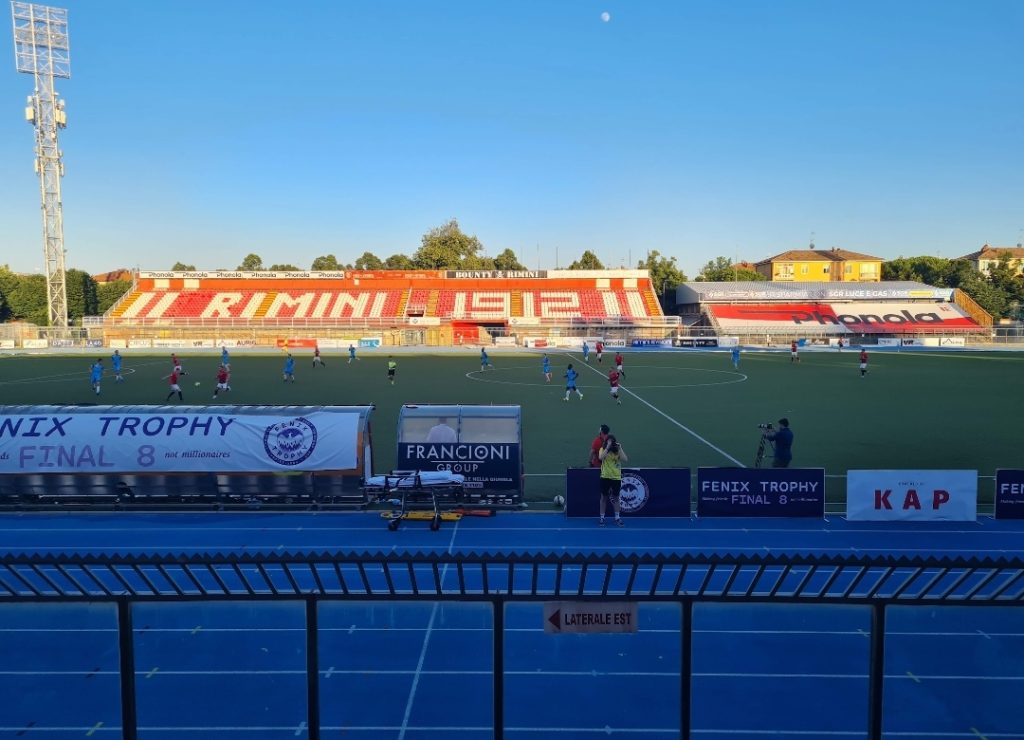
First-team manager Neil Reynolds lauded the fans after the victory, insisting their support can rival any team at any level.
He said: “It feels emotional, it’s been a dream, and the question was could we come out here and do it and we have.
“As a manager, I’m over the moon. I’ve been reminded over the last three years that I’ve not won a trophy but I have now.
“We’ve got a great group, we’ve been blown away by how many people have travelled, and we’ve bumped into so many in FC shirts.
“I know we are a non-league club but we don’t belong in non-league with this set of fans who are better than league clubs and can rival Premier League clubs. They don’t give up and they follow us all over Europe.”
Following in the footsteps of many heroes of the past, it was a long journey of hard work and determination from thousands of volunteers, focussing on the community, friendship and their deep-rooted love for the game.
The competition’s tagline ‘making friends and not millionaires’ is more relevant than ever, with the morales of modern football under a microscope after huge state-backed Premier League takeovers and the World Cup in Qatar.
It makes the idea of ‘punk football’ even more appealing and it’s something that’s echoed throughout the culture and history of FC United.
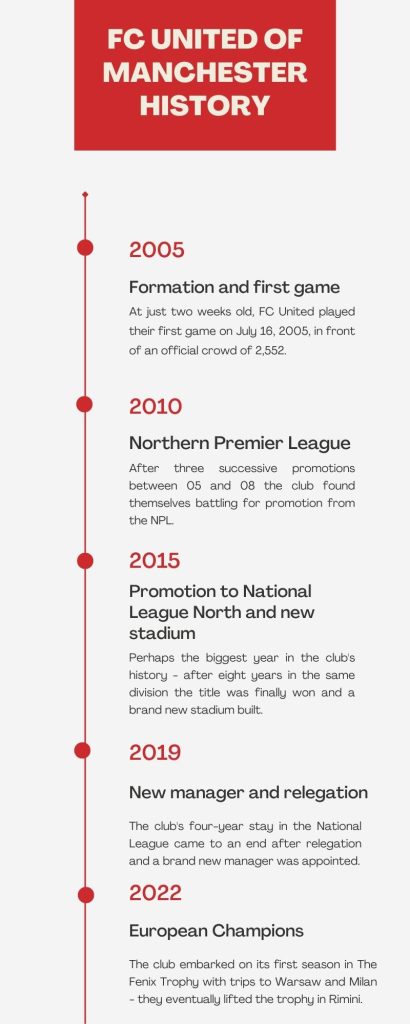
Early success
When FC were founded, emulating ‘Big United’ and competing in Europe was a pipe dream.
Many people didn’t expect much from this newly formed phoenix club, with ex-United player Alan Gowling famously saying that they wouldn’t survive until Christmas.
They would prove him wrong, with three consecutive promotions taking them to the Northern Premier League, just three steps from the EFL.
FC would remain in the seventh tier until 2015, with a notable highlight in between being an FA Cup second-round appearance.

Broadhurst Park
When promotion to the National League North finally came, it coincided with the club finally moving to a permanent home of their own.
The Broadhurst Park curtain was raised in style as FC hosted Portuguese outfit Benfica, a homage to Man United’s European Cup triumph over the club in 1968.
Football fans from across the world often stop by to sample the unique history and experience a game on the terraces, a vast contrast to the two Premier League giants the city is known for.
New era and FA Cup return
After four years in the sixth tier, with dreams of going even further, FC suffered their first-ever relegation
Whilst it may have been viewed as the start of a gradual decline, success continued and new heights were reached.
In the Covid season of 2020, the club retunred the first round proper of the FA Cup, restrictions prevented supporters from watching the game and League One opponents Doncaster Rovers ran out 4-1 winners.
After achieving so much domestically, what next?
Luckily they weren’t the only team fighting the good fight and trying to rid football of its tarnished, corrupt reputation. Many teams around the world were just the same.
European success
The idea of a European competition featuring clubs with similar philosophies to FC United was first mooted back in 2020 by a non-league side from Italy, Brera FC.
They wanted to create a real “cult” network of non-professional clubs, and the first edition took place last season.
FC are the only English club involved and were drawn into a group with hosts Brera, AKS Zly of Poland, and DWS Amsterdam who had to forfeit their group matches due to Covid complications.
Andy Halls, a defender at FC, said: “It’s a first experience for me playing in a competition like this, I’ve never played in Europe with a club team before and I’m really looking forward to it.
“I don’t know too much about the standard but I’m confident that we can find success, we just need to take it in our stride and enjoy it.”
A phoenix is used as the symbol of the competition, a mythological bird that regenerates from its predecessor’s ashes; it stands as a metaphor and a wish for the rebirth of new football models.
There were four other clubs who took part in the inaugural edition from Italy, Spain, Germany and the Czech Republic.
Hundreds of fans in red made the trip to the Italian coastal city, with many having fond memories of following Man United on the continent in the 80’s and 90’s.
For them, this was a chance at redemption, and June 11 would become another unforgettable day in their footballing lives.
FC United ran out 2-0 winners against Prague Raptors and were crowned Champions of Europe for the first time in their history, emulating the Busby Babes of 68′ and the treble winners of 99′.
After comfortable wins against AKS Zly in Warsaw and Brera in the iconic surroundings of Milan’s Arena Civica, FC qualified for the final in Rimini.
2022/23
This season is about keeping that crown and the club are competing in Group B alongside newcomers and two-time Belgian champions KSK Beveren.
They have a European backstory of their own having lost to Barcelona in the 1978-79 Cup Winners Cup semi-final.
FC will also travel to Valencia to face CD Cuenca-Mestallistes who competed in last season’s tournament.
Their opening game took place last month at Broadhurst Park where they defeated Beveren 4-1, despite the big margin, the two clubs’ participation in the competition means so much more than just the result.
The Red Rebels’ faithful have two, possibly three more European away days to look forward to next year, and maybe they can do what ‘Big United’ have never managed, and retain their European title.
